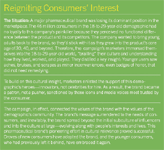Direct to Consumer: Culturally Relevant Marketing
By immersing themselves in the culture of the target audience-visiting where they live, shop, and consume media-marketers can discover what consumers want and need before they demand it.
Today's consumers live in an era of informational overload. Bombarded by exceedingly general advertisements that offer little application to their lives, consumers have become skeptical and distrustful of mass-market advertising. As a result, they have created their own information filters by turning to the Internet. Using blogs, wikis, and podcasts, consumers are finding information that has meaning, relevance, and value to their lives.

Meg Columbia-Walsh
While consumers may have tuned out traditional mass market media, they do pay attention to more targeted marketing approaches. To that end, a new DTC model has emerged that seeks to be more relevant. By identifying cultural shifts taking place in society and particularly among a targeted demographic, marketers can better direct their messages to obscure, smaller, interconnected subcultures, which are harder to reach with broad-based advertising approaches. Armed with insight into how they think, companies can seamlessly weave their products and services into the lives of consumers. Once the brand reflects the values of their lifestyle—and becomes part of their culture—consumers will be more apt to listen to that company's message.
Guiding Principles
To achieve cultural relevance, pharma marketers must first understand how consumers respond to promotional messages. Today's consumers see through spin. Less than 13 percent of consumers believe healthcare information from a pharma company is more trustworthy than information provided by any other organization, according to 2005 data from Datamonitor. Unless pharma makes its messages culturally relevant, consumers will stop listening entirely. To achieve this, a campaign must abide by the following principles:
Authenticity Today's consumers have an unerring nose for fakes—brands that try too hard or do too little to justify their premium price. Consumers see honesty and transparency as a sign of integrity. Therefore, brands should acknowledge their mistakes before consumers do. Johnson & Johnson set a standard of openness and trust in 1982 by turning a potentially disastrous tampering case involving Tylenol into a model of corporate honesty.

Reigniting Consumersô Interest
Lifestyle affinity Consumers don't buy products based on functional merits alone—they choose products that support their interests and lifestyles. Mercedes Benz understands this concept. Because the brand exudes luxury, people who identify with or aspire to a lifestyle of luxury buy these cars. Therefore, by understanding consumers' lifestyle preferences, marketers can integrate a brand's identity into their lives.
Commitment Consumers like to feel that a brand is invested in their well-being for the long term. Brands will see the payback in dollars as well as in longevity—just look at Nike's line of sports gear for women. Marketers can buy media, but they must invest in culture.
Specificity Culture comprises a mass of interlinked subcultures. Identifying those that fit best with a particular brand will help determine which populations represent the highest opportunity segments. To weave a brand into a consumer's reality, marketers need more knowledge than sterile quantitative research can provide. By immersing themselves into the culture of the targeted audience—visiting where they live, shop, and consume media—marketers can discover what consumers need before they demand it, allowing them to proactively attract their target.
Regain Trust
Cultural-relevance tactics can help marketers navigate through the new consumer landscape. Whereas patients of the past felt uninformed, reactive, and disempowered, now they hunger for health education. Consumers' regard for health has transformed from preventing illness into proactive wellness. That means they don't want glitzy marketing messages—they want advice they can trust.
Ultimately, the success of a campaign hinges on whether key influencers—those whom consumers trust—support the brand. By associating brands with real-life leaders, not just celebrities, consumers will see the brand as trustworthy (See "Reigniting Consumers' Interest").
Marketers must also be aware of another influence: consumers' online peers, whom they communicate with through blogs, wikis, and Web sites. These social networks help to define and shape the culture at large. Savvy marketers will get to know them too. After all, consumers don't only buy brands, they join them.
At the same time, many are overconfident and underqualified to properly interpret this information. By practicing relevant marketing, marketers can gain consumers' trust so they can educate and guide their brand decisions.
A Look Ahead
Pharma practices are changing for the better. Here's a snapshot of tomorrow:
- Clinical trial results are open and accessible to the public
- Well-educated existing patients collaborate with new patients to teach them how to administer drugs
- Patients become conversive in discussing side effects that clinical trials might miss
- Real stories become the main conduit for consumers' discovery of new drugs.
This vision of healthcare starts with giving patients more personalized information. Marketers should embrace this opportunity to address consumers' expectations through their brands.
Awards
The following agencies were honored at the 7th Annual Pharmaceutical Advertising and Marketing Excellence Awards (PhAME): Cline, Davis & Mann won the Public Health Award for its Partnership for Prescription Assistance ad; Grey Worldwide won Agency of the Year, and Best Media Plan and Best New Product Introduction for its Cialis campaign;

The 2005 PhAME winners
Eli Lilly won Marketer of the Year; Ruder Finn won Best Public Relations Campaign for its Zelnorm ad; Avenue A/Razorfish won Best Interactive Campaign for its Nexium ad; Saatchi & Saatchi won Best Branded TV Ad, also for Nexium; Foote Cone & Belding won Best Integrated Campaign and Best Relationship Marketing Campaign for Strattera; Dieste Harmel & Partners won Best Multicultural Ad for Sana La Rana; and Gillespie Healthcare won Best Help Seeking Ad for Plavix.

Presenter Cheryl Ladd and emcee Steve Kroft (below).
Sharon De Bacco, consumer brand director at AstraZeneca, and Bob Ehrlich, CEO of DTC Perspectives, were inducted into the DTC Hall of PhAME. Steve Kroft of 60 Minutes was the emcee. Entertainer Cheryl Ladd presented the Public Health Award.

Ed Leon
People
Joseph Maynard joined Adient, a Common Health company, as executive vice president and managing director. Christine Maikisch joined as senior vice president of operations.S&R Communications selected Ed Leon and Bryan Carson as account group directors.

Christine Maikisch

The Misinformation Maze: Navigating Public Health in the Digital Age
March 11th 2025Jennifer Butler, chief commercial officer of Pleio, discusses misinformation's threat to public health, where patients are turning for trustworthy health information, the industry's pivot to peer-to-patient strategies to educate patients, and more.
Navigating Distrust: Pharma in the Age of Social Media
February 18th 2025Ian Baer, Founder and CEO of Sooth, discusses how the growing distrust in social media will impact industry marketing strategies and the relationships between pharmaceutical companies and the patients they aim to serve. He also explains dark social, how to combat misinformation, closing the trust gap, and more.